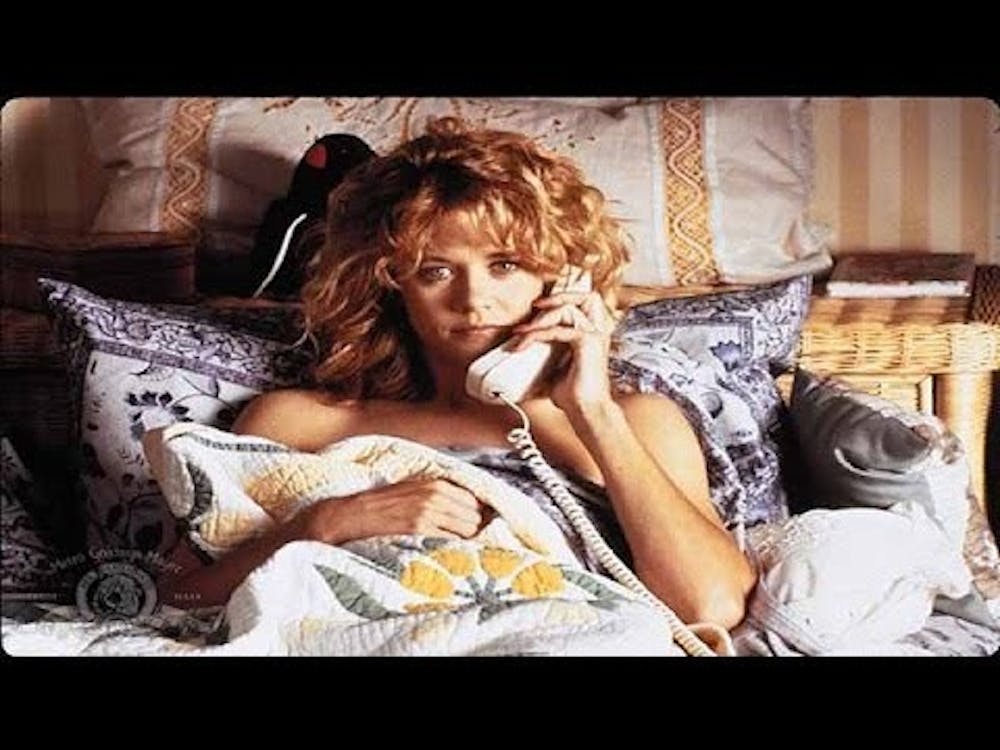When Valentine’s Day rolls around each year, a slew of love–related movies make their way back onto TV and onto people’s “What to Watch” lists. Among these is When Harry Met Sally, a 1989 romantic comedy starring Billy Crystal and Meg Ryan. The film is known to be a classic, as well as one of the first (and best) romantic comedies. We asked three Street writers who have never seen the movie to watch it and give us their thoughts on the characters’ contemplation of whether men and women can ever truly just be friends. Based on their responses, it seems that (at Penn, at least) the answer is usually no.
Keara Jenkins: “Platonic Stage Seemed Long”
I loved this movie. It was definitely one of those great, classic movies where one leaves wondering, “How come I’ve never seen this before?” Both Harry and Sally are likeable but quirky, weird in a way that makes them more human and relatable. I also enjoyed watching a great movie that I hadn’t seen before, because it oddly gave me a hope that there are more good movies out there than just the mediocre ones I find on Netflix. The line, “men and women can’t be friends” and its recurring theme throughout the movie makes When Harry Met Sally interesting, relatable and applicable to most people who have ever been friends with the opposite sex or been confused by that friendship. On the other hand, my roommate later pointed out to me that the “men and women can’t be friends” line is a reason why she dislikes the movie. She feels that the movie focuses on how men and women can’t be platonic. I’m not sure if that can be attributed to When Harry Met Sally, but she does make an interesting point.
While I really enjoyed the movie, the timespan of the platonic stage of Harry and Sally’s friendship seemed unrealistically long. Twelve years, really? I would reason that in under 12 years, Sally would have cried or some other situation would have occurred leading a pair of straight, opposite sex best friends to hook up
Stephanie Barron: “Ideals Are Mutually Exclusive”
The central question of When Harry Met Sally is whether or not it is possible to sustain a friendship between a man and woman, because, presumably, sexual tensions will eventually get in the way. We live within a microcosm of the world that Harry and Sally inhabit because Penn is far more gendered than the rest of modern society. As a freshman, I was quickly indoctrinated with the premise that my social life in college would revolve around hookup culture, whether or not I chose to participate in the hookups themselves. I learned that, with few exceptions, the way to be socially relevant or even active was to join either a Greek organization or a sports team, both of which are segregated by gender. As a result, socializing within these institutions often comes with romantic or at least sexual implications, and socializing outside of them is just plain difficult to do. Before college, there were a number of people who I considered close friends, and, despite the fact that I attended an all–girls school for nine years, only two of them were girls. At Penn, while I certainly know boys I might refer to as my “friends,” and while I would never admit this to them, I can’t say that I have many that have lasted beyond freshman year and remained totally platonic. It seems as if, at Penn, these two ideals of a friendship between a man and a woman are mutually exclusive.
Genevieve Hagedorn: “It’s Imperfect Because We Are”
Admittedly, I had a few tears streaming down my face when the credits started rolling. Harry’s declaration of love at the end of the movie is iconic, and I could tell that many rom–coms since have tried to recreate those, “I love you for inexplicable little reasons” type of scenes. And as cliché as it may seem, it really works. Maybe it feels more genuine because the two were friends for over a decade, or maybe it's because Billy Crystal’s character is exactly that fast–talking, slightly neurotic guy who delivers the lines effortlessly. Bottom line, I walked away with a mad case of the feels.
I thought the screenplay was really smart and brought up a lot of good discussions about love, dating and sex. I feel like I have many of those same conversations with friends of mine. Despite the cynicism underlying a lot of Harry and Sally’s conversations, I think the main message of the movie is that love still cuts through all the fears and caveats that society feeds us about marriage and relationships. When it’s love, you can’t fight it, you can’t rationalize it. It’s imperfect because we are. Reflecting on When Harry Met Sally has suddenly given me the urge to read some Shakespearean sonnets and write a love letter for the DP Valentine’s Day issue. If that isn’t a testament to how much I loved this movie, then I don’t know what is.

